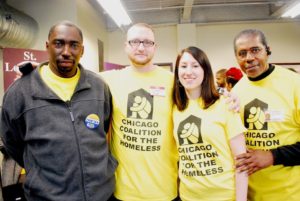Rachel Ramirez, a senior organizer, is leaving CCH to pursue a Ph.D in management and organizations, and in sociology, at Northwestern University’s Kellogg School of Management. She plans to research community organizing as a model of organizational leadership.
We asked Rachel to reflect on her six years of organizing people who experience homelessness.
“Let me say from experience, the women being held didn’t learn, gain, or accomplish ANYTHING!”

These were one of my grassroots leader’s words, assessing what women in prostitution got out of their incarceration for what was then a felony sentence in Illinois. She said them as part of her testimony before the Illinois Senate Judiciary Committee in 2013, with an emphatic tone that was deadly serious and painfully ironic, eyes glowing, voice steady, wearing a yellow CCH T-shirt. She also said them privately to me 20 or 30 times over the phone, in my office, in Dunkin Donuts, on the Amtrak train down to Springfield, as we worked together over many hours to hone her 3-minute testimony. Her words were key to passing SB1872, which “de-felonized” (her term) prostitution in Illinois.
Though Glenda ultimately delivered her testimony with such devastating confidence in Springfield, during the time we prepared her to give it, she asked me a question I have since heard innumerable times from CCH leaders getting ready to tell their stories in the public arena. About the above line, she asked me: “Can I say that?”

Can I say that? is not a question of permission. Leaders are not routinely asking me, as “their organizer” (as I’m called!) for permission to say what they want about their lived experience. Can I say that? is a strategic question asked in confidence, an acknowledgement that the people who they need to reach with their words may not get it. May not be able to handle the truth. May not come from where they come from. Leaders are asking me for my opinion on whether speaking aloud their critical analyses of their own lives will help or hurt our cause. Because we both know that these supposedly neutral public spaces where laws are made are saturated with the same racist, classist, sexist attitudes of general society. And we both want to win and see change happen.
I feel qualified to give an opinion on this question, because like most organizers I am a constant student of power and strategy, and like all organizers I want to see the leaders I work with succeed. Eventually my sensibilities for these things melt in with those of my leaders as we form a cohesive team towards many victories, large and small; from passing a new policy to getting a single “yes” commitment from a legislator.
Ninety percent of the time when I get the Can I say that? question, my answer is yes. First of all, we probably overestimate the extent to which we should or have to censor ourselves for strategic reasons. The barriers that supposedly separate understanding between communities are usually only convenient (for some) and illusory, and the truth will often not land as shockingly as we might believe.
And second of all, “yes,” we can say that because that is what organizing is about – getting the truth to matter, in a powerful way. My first inkling of this underlying work of organizing was during my time as an intern at Midwest Academy. This is what drew me to the field. As an organizer at CCH, my wildest dreams about what that could mean have come true. Every time we step into the public arena as CCH organizers and leaders, we get to speak the truth of what homelessness is like and why we need to end it; most importantly, people who are directly impacted by homelessness get to tell that truth. In my particular role at CCH, speaking the truth has gotten us many victories in removing barriers to housing and employment for people with criminal backgrounds.
For the 10% of the time I have to advise leaders that “no,” they shouldn’t say that, it’s always followed with a “because….” I have always seen my role as an organizer as being transparent with my leaders, for their learning as advocates, for the good of our campaigns, and the growth of CCH as an organization. I want leaders to know what I know so that we can grow into a more sophisticated, more powerful team, and so we can all be more informed and capable participants in this society.

I am beyond grateful for my time here at CCH. For the beautiful relationships I have developed with people all around the city who dare to stand up and fight to end homelessness. For the mentoring I have received, especially from our former organizing director and my friend, Jim Field. And for the support of this organization and the organizing community in general as I set off on my own next chapter, which I sincerely wish will contribute to the further growth of organizing as a method for change.
Another aspect I have loved of my time at CCH, which I think is what many organizers love about our work, is that through all of this process of working together with our leaders, individual lives are transformed as much as the policies and social realities we fight to change. So I’ll end this blog with another quote from Glenda’s testimony, which I humbly hope sums up the impact we are able to have for people through our work together.
“I let [other survivors of prostitution] know that just because I was in it for 28 years, you might think there’s no hope, but there is some help out here now finally for us,” she said. “I just want them to hang on, and if somebody extends their hand to help them, grab onto it because there are some people out here who really care.”
